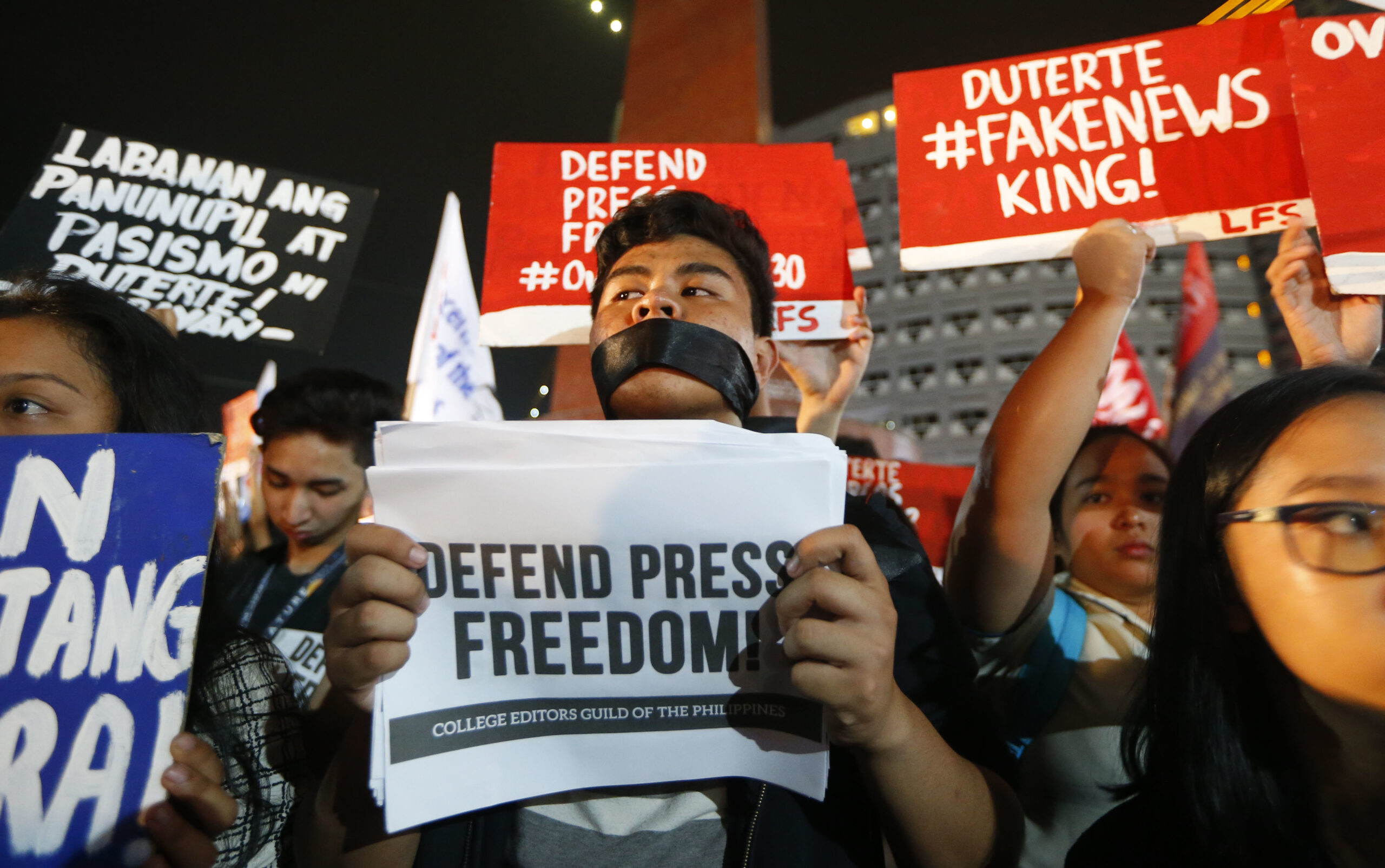May 3 was World Press Freedom Day, and it came at a time when the environment may be tougher than ever for journalists. With the rise of authoritarian regimes, and reactionary responses to the booming information sharing of the digital age, legal attacks on journalists around the globe are mounting. According to the Committee to Protect Journalists, 363 were jailed worldwide in 2022 and countless others faced some form of legal harassment.
But while this reality is deeply felt by media experts and reporters, there hasn’t been a global, comprehensive review of the crisis. Until now.
In a study produced by the Tow Center for Digital Journalism and funded by the Thomson Reuters Foundation, nearly 500 journalists around the globe were surveyed about their experiences with legal threats. Close to 50 percent of them responded that either they or their media outlet have experienced a legal threat in some form. Using qualitative and quantitative data, and incorporating multimedia elements such as video testimony, the report — which was released in April — captures their insights as well as those of dozens of media freedom experts.
Joel Simon, lead author and founding director of the Journalism Protection Initiative at the Craig Newmark Graduate School of Journalism at CUNY, spoke with Nieman Reports about the report’s findings and recommendations, and why access to information is a “fundamental human need.” The conversation has been edited for length and clarity.
What drove the creation of this report, and how is it unique?
One of the data points that I observed when I was at the Committee to Protect Journalists was the number of … legal threats [toward journalists] is mounting. But other than our prison database, which we compiled every year, we really didn't have a lot of data about this.
When I got to the Tow Center, Antonio Zappulla [chief executive officer of the Thomson Reuters Foundation] approached me and said he noticed this as well. We came up with a methodology that we thought would capture the full range of threats … using a survey of experts that we identified, and then a survey of journalists.
I obviously spent my career defending the rights of journalists. So [the topic] wasn't new. But seeing all these journalists recount the experience of facing this kind of harassment [in] one-minute self-recorded videos, I found it very powerful. It really drove home what's at stake and what the sensation is of facing systemic legal harassment.
What kinds of legal threats did the respondents describe?
The first are the kinds of traditional legal strategies which are difficult to combat because the legal framework is a legitimate one. Nobody says you shouldn't have laws against defamation, but they're very easy to manipulate and weaponize.
The second bucket are things that are more frequently abused. [There’s] cyber libel, which is really just a defamation claim particularly targeting independent [and digital] media outlets. Then, there [are] national security laws where in a certain context they can have some legitimate legal basis, but they're frequently abused.
And the third [bucket] is completely not related [to the profession]. If you're accusing someone [of] extortion or money laundering or drug trafficking, even if the charge doesn't stick, it's incredibly damaging and undermining. And it inevitably attracts a huge amount of online attacks. And then, these cases are so difficult to defend. … [They] require specialized lawyers who handle criminal cases, and they're not really part of this community.
Why are these legal threats increasing?
We didn't try to answer that in the study because there are a variety of factors. But what I observed [is that] there's a natural conflict between independent journalists and every government that wants to control and manage information, and the ability to do that is essentially key to retaining power.
The thing about legal tactics [is that] they work really well where the government controls the independent institutions that oversee the administration of justice. Now, violence [toward journalists] is relatively rare, and it's all state repression because that's a much more effective strategy.
What does the report recommend for addressing this problem?
One is, there's an issue of principle. There's something called the Media Freedom Coalition, which are a grouping of governments that have expressed a commitment to defense of freedom of expression principles. But you know, they don't always follow through … in terms of setting an example and speaking out when violations occur. Policy that governments undertake in this space is only credible if they're perceived as being grounded in fundamental principles.
The second thing that I think we identified is there's a huge amount we don't know. One thing [that] emerged from the surveys of the experts or the journalists … [is] there are quite a few discrepancies …. about what constitutes the most critical risks. I think we need to dig down further into that research and find out whether [those discrepancies are] a function of the specific legal environment in a particular country or the identity of the journalists involved or the nature of its publication.
The third thing is that we need a legal defense strategy. If you want to defend the rights of journalists, we're going to have to expand support for journalists facing legal threats. Reporters Shield is a great initiative that's seeking to do just that. There are other organizations dedicated to this. Media Defense is one of them.
How do you feel about the future of journalism given the threats journalists face?
You can’t do this work unless you're fundamentally optimistic, but that optimism is derived from the role that journalism serves in any society and the powerful need that exists. We're always fighting for that information, whether it's presented to us in the form of traditional media or some other kinds of information networks.
I've always believed that this is a fundamental human need that is threatening to powerful structures. And so that dynamic and the conflict is always present. And there [are] positive things happening in the journalism space, particularly in the United States. I think we're seeing much more local media really take hold — nonprofit media becoming institutionalized and actually becoming sustainable in some contexts — you know, bright spots in this information landscape.
You have to hold on to your belief that [if] circumstances are aligned, it can lead to some positive change.
Correction: An earlier version of this story misspelled the name of the Thomson Reuters Foundation. We have updated the text and regret the error.



